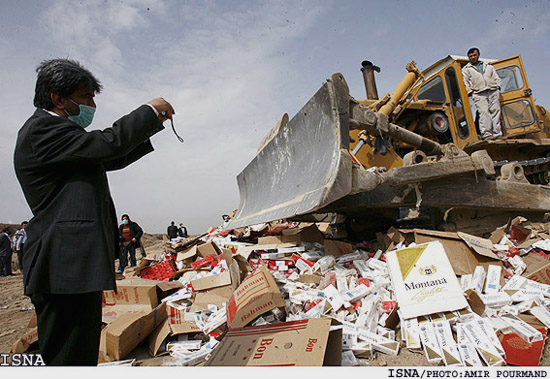In early August Iranian President Mahmoud Ahmadinejad nominated four new ministers to the 290-member Majlis, the Iranian parliament. Among the four was a new oil minister, Rostam Ghasemi. Until his nomination Ghasemi was the head of the major engineering arm of the 125,000-strong Islamic Revolutionary Guards Corps (IRGC), which employs 25,000 staff on projects worth an estimated US$7 billion. These include government contracts to develop oil and gas fields.
On August 3, the Majlis approved Ghasemi’s nomination by 216 votes. In a parliamentary debate before the vote, Ali Motahari, a prominent conservative MP claimed that Ahmadinejad was attempting to “militarise” the government and the Majlis with Ghasemi’s nomination. Eighty of the seats in the Majlis elected in March 2008 were estimated to be held by former IRGC commanders, as were 10 of the 21 ministers in Ahmadinejad’s previous cabinet, formed in September 2009.
On July 1, Ahmadinejad declared on national television that “All illegal borders must be closed. It is not acceptable to say it belongs to such-and-such institution or organ. Each one of them has opened a hole in some corner and is importing and exporting things at will.” He added that “Cigarette consumption in Iran is a $2-billion business annually... it would tempt the top smugglers of the world, let alone our own smuggling brothers.” This was widely interpreted to be a reference to the IRGC. In 1999, Mehdi Karrubi, then speaker of the Majlis, made public some of the IRGC’s smuggling activities through 60 unauthorised docks that it controlled.
In an interview given to Iran’s Mehr news agency in July, Iran’s IRGC Commander Mohammad Ali Jafari said that “like other military institutions [it] controls a number of military piers, but no financial transaction is conducted there”. In the same interview, Jafari disclosed that the IRGC had been assigned by Iranian Supreme Leader Ayatollah Ali Khamenei to combat the “deviant current”, a term used to describe Ahmadinejad’s chief of staff Esfandiar Rahim Mashaei and other officials closely associated with the Iranian president.
Mashaei has been accused of promoting the messianic idea of the imminent return of the Mahdi (according to Shi’ite Islam, the 12th and final rightful successor to the Prophet Mohammed) and that in his absence Shi’ite Muslims have a personal connection to the Mahdi that implicitly makes clerical interlocutors such as ayatollahs unnecessary. In July 2009 the US Public Broadcasting Service’s Frontline program reported that Mashaei had said: “An Islamic government is not capable of running a vast and populous country like Iran.... Running a country is like a horse race, but the problem is that [the clergy] are not horse racers.”
The last known arrest of an Iranian official to be accused of being associated with the “deviant” current occurred on June 23. The same day’s New York Times reported that Mohammed Sharif Malekzadeh, who had resigned as deputy foreign minister a few days earlier, was arrested on unspecified charges. The same report claimed that this meant the “rift between the president and Ayatollah Ali Khamenei, the nation’s spiritual leader and highest authority, has worsened”, adding that “Ahmadinejad has been challenged on each of his cabinet appointments, including those of oil minister, sports minister and foreign minister” by Khamenei.
Speaking to reporters after a cabinet meeting on June 29, Ahmadinejad declared: “I will hold myself responsible to defend the cabinet ... the cabinet is a red line and if they want to touch the cabinet, then defending it is my duty.” The June 29 British Guardian reported “that at least 25 other people close to Ahmadinejad and his chief of staff, Esfandiar Rahim Mashaei, including top presidential aides such as Kazem Kiapasha and Abbas Amirifar, were detained in recent months, after the extraordinary power struggle at the heart of the Iranian regime became public. Iranian media also reported that a group of arrested allies of the president have ‘confessed’ to their crimes.”
The same Guardian report added: “Ahmadinejad and Khamenei have played down their split in public, but recent arrests and clashes between the president and the parliament, which overwhelmingly supports the supreme leader, have brought to light the extent of the rift. “In his brief meeting with reporters on Wednesday, Ahmadinejad said he would continue to stay silent against unprecedented verbal attacks on him and his narrowing circle, but he did warn that there would be a limit to his patience …”
“Iranian politicians had been pushing to impeach Ahmadinejad should he continue his support for Mashaei and bombarded him with criticism in the parliament this week. However, IRNA [Islamic Republic News Agency] quoted an influential Iranian MP, Mohammad Ebrahim Nekonam, on Wednesday as saying that the motion to impeach the president had been halted. The decision not to impeach Ahmadinejad comes after an apparent attempt by Khamenei to appease the president and defuse the tension between him and parliament.”
The decision by the big majority of MPs, who are supporters of Khamenei, to endorse Ahmadinejad’s latest nominations to his cabinet, including Ghasemi as oil minister, would appear to have put an end to the public manifestations of the rift between them.

